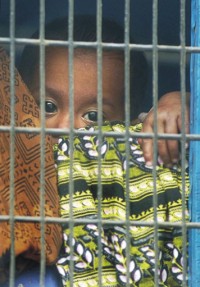Rights Investigation
No proper accommodation for children in prison
 As there is no separate room or cell for accommodate the children and child accused, then children have to stay with their accused mother in the same cell in the prison. Children accused of crimes are being kept with convicts and on-trial prisoners despite the fact that it is against law in different prisons or sub-jails. It also noted the deplorable lot of children of female inmates staying with their mothers. In this situation these children are grooming up with the criminal mothers and also with criminal mentality. Children living in jail become more vulnerable to diseases due to the poor living condition there. Overcrowded prisons, lack of proper ventilation, poor food and inadequate medical facilities make the situation worse and horrible for the children. This is the condition of the jails in Meherpur, Kushtia. There is no arrangement for children's recreation in the jails.
As there is no separate room or cell for accommodate the children and child accused, then children have to stay with their accused mother in the same cell in the prison. Children accused of crimes are being kept with convicts and on-trial prisoners despite the fact that it is against law in different prisons or sub-jails. It also noted the deplorable lot of children of female inmates staying with their mothers. In this situation these children are grooming up with the criminal mothers and also with criminal mentality. Children living in jail become more vulnerable to diseases due to the poor living condition there. Overcrowded prisons, lack of proper ventilation, poor food and inadequate medical facilities make the situation worse and horrible for the children. This is the condition of the jails in Meherpur, Kushtia. There is no arrangement for children's recreation in the jails.
A group of child journalist of Shishu Prokash, which is an initiative of Mass Line Media Centre and UNICEF made inquiry about the prison conditions for children in different districts. The report notes that police is unaware of the rights of children and sometimes send the children to jail by registering them as over 18 years old. Moreover, they do not spare the children from physical torment and even physically abuse them while in custody. However, majority of the children are arrested under special laws such as the Special Powers Act, the Narcotics Control Act and so on, the report says. It also mentioned use of children in armed combat by the political parties during strikes and other activities. The report says till they are 18 years old children need to be protected from the harsh laws. Hundreds of juveniles are illegally detained in Bangladeshi prisons in violation of the Children Act of 1974 and Bangladesh's obligation as a party to the United Nations Convention on the Rights of the Child. According to a list prepared by the Dhaka Central jail authorities in December 2003, there were at least 108 juvenile delinquents being held in Dhaka Central Jail instead of correction centres.
Section 2(f) of the Children Act of 1974 provides that any person below 16 years is a juvenile and must be sent to a "certified home or approved home or to the custody of a relative or other fit person". However, age verification has never been taken seriously in the administration of juvenile justice. Often, police increase the age of a juvenile while producing before a court to avoid so called legal complications. Even when the court orders to send the juveniles in correction centres, court orders are ignored and children continue to be detained in prison. The mal-treatment of the juveniles in Bangladesh are in contravention of international standards on administration of juvenile justice and in particular articles 37, 40 and 39 of the United Nations Convention on the Rights of the Child. Hence it is expected that the concerned authority should properly investigate the matters and take steps accordingly.
A group of child journalists from Shishu Prokash, Meherpur, Kushtia